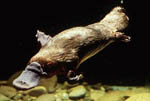 The platypus (Ornithorhynchus anatinus) is a member of the order of monotremata, the egg laying mammals. It is very strange: a venomous, duck-billed, egg-laying mammal (?!). It is unlike we have ever seen, until now! Recent fossil discovery of an extinct species named Akidolestes, a half shrew - half platypus species, challenges conventional wisdom about how placental mammals split from earlier egg-layers. The platypus has a low body temparature compared to other mammals, it is only 32°C compared to 38°C. The platypus is one of the closest relatives of ancestral mammals, although it is not itself a link in the chain of mammalian evolution. Its branch is quite separate from any other one known to man. The recent fossil discovery of Akidolestes gives hope to get more insight in the separation of this branch.
The platypus (Ornithorhynchus anatinus) is a member of the order of monotremata, the egg laying mammals. It is very strange: a venomous, duck-billed, egg-laying mammal (?!). It is unlike we have ever seen, until now! Recent fossil discovery of an extinct species named Akidolestes, a half shrew - half platypus species, challenges conventional wisdom about how placental mammals split from earlier egg-layers. The platypus has a low body temparature compared to other mammals, it is only 32°C compared to 38°C. The platypus is one of the closest relatives of ancestral mammals, although it is not itself a link in the chain of mammalian evolution. Its branch is quite separate from any other one known to man. The recent fossil discovery of Akidolestes gives hope to get more insight in the separation of this branch. Image:
Author striatic http://www.flickr.com/photos/striatic/17367/
Licensed under Creative Commons Attribution ShareAlike 2.0
Resources:
National geographic news
Wikipedia on the platypus
The Duck-billed platypus, platypus is listed as Least Concern (LR/lc), lowest risk. Does not qualify for a more at risk category. Widespread and abundant taxa are included in this category, on the IUCN Red List of Threatened Species
Namings for the duckbilled platypus
A young / baby of a duckbilled platypus is called a 'pug'. A duckbilled platypus group is called a 'pile'.Countries
AustraliaSome facts about the
Duck-billed platypus
Adult weight : 1.25 kg (2.75 lbs)
Maximum longevity : 23 years
Female maturity :548 days
Male maturity : 548 days
Gestation : 17 days
Weaning : 106 days
Litter size : 2
Interval between litters : 365 days
Basal metabolic rate : 2 W
Body mass : 1.03 kg (2.266 lbs)
Temperature : 33.85 °C (92.93 °F)

Custom Search